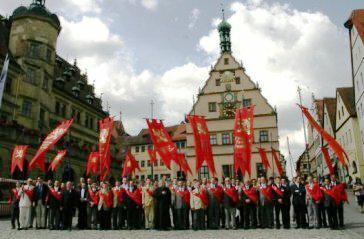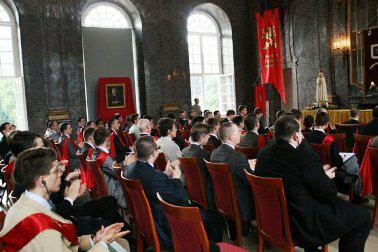TFP Student Conference in Germany

What I liked about the summer conference was that everyone was on the same page,” remarked one American student. “We came from all over but we were all united in thought.”
Such sentiments reflected those of many participants at the TFP’s 2008 Eighth International Student Summer Conference (Université d’été) in Kleinheubach, Germany. The conference was the project of the Tradition Family Property (TFP) organizations in France and Germany from July 21-26 with the theme: “The Counter-Revolutionary Crusade Today: On the Occasion of the Centennial of the Birth of Plinio Corrêa de Oliveira.”
Nearly 100 participants made up delegations from Austria, Germany, the United States, the United Kingdom, Poland, Brazil, Paraguay, Italy, and other nations gathered at the stately eighteenth-century Lowenstein Castle in an atmosphere of unity and resolve.
The conference was especially honored the presence of Monsignor Camille Perl, vice president of the Ecclesia Dei Commission who celebrated several traditional masses for the event. Other priests also led the prayers and provided daily mass for the duration of the conference. Another distinguished guest was Duke Paul of Oldenburg who delivered an inspiring address and closing remarks.
Timely Talks
The talks at the “Summer University” centered on the works of Prof. Plinio Corrêa de Oliveira on the occasion of the centennial of his birth. Delivered by TFP members and friends from around the world, the talks were simultaneously interpreted in five languages.
The speakers concentrated on past campaigns initiated by Prof. Plinio Corrêa de Oliveira especially those against land reform in Brazil and French self-managing socialism. German TFP member Mathias von Gersdorff delivered a masterful presentation on his last great campaign in defense of Christian civilization which was his book defending nobility and analogous traditional elites.
Based on the book, Revolution and Counter-revolution, speakers showed how the insight and analysis of Prof. Plinio Corrêa de Oliveira is helpful in understanding present-day dangers and events. Italian scholar, Prof. Roberto de Mattei developed the theme of the present counter-revolutionary struggle in the context of the sexual revolution and modern attempts to change human nature.
American TFP member Michael Drake gave the final presentation, “Our Lady’s Central Role in the Counter-revolutionary Crusade.”
Visits and Interaction

Study workshops followed the talks as participants had the opportunity to ask questions about most talks, discuss them and apply them to concrete reality.
Moreover, each national delegation added to the understanding of both the universal nature of the values of Christian civilization and that of the aberrations of the Revolution. The delegations could discuss their own activities and successes. Although so diverse, participants were on the same page.
As in past conferences, participants visited nearby places related to Christian civilization. Whether at the nearby Waldurn Shrine with its famous Eucharistic miracle or a banquet at the bishop-prince's residence in Wurzburg, all was oriented toward a marvelous understanding of what Christian civilization was and what values need to be restored.
The program was full of memorable events. There was a dinner at the Castle’s “brewery” with live local folk music. There was the presentation of a local fife, drum and brass marching band and an evening barbecue on the castle grounds. From the solemn raising of the TFP standard in the morning to the final prayers at night, an atmosphere of conversation, conviviality and prayers reigned over Lowenstein Castle.
A Final Banquet
The final banquet in the majestic ballroom brought an end to the week which came all too quickly. Representatives of the national delegations delivered speeches and testimonials. Diplomas and presents were distributed. Closing remarks by Duke Paul of Oldenburg and others reminded the participants of the fight ahead.
The Université d’été is an excellent initiative on the part of the TFP organizations in Europe. The excellent organization and coordination let participants take maximum advantage of the program and helped keep everyone “on the same page.”

